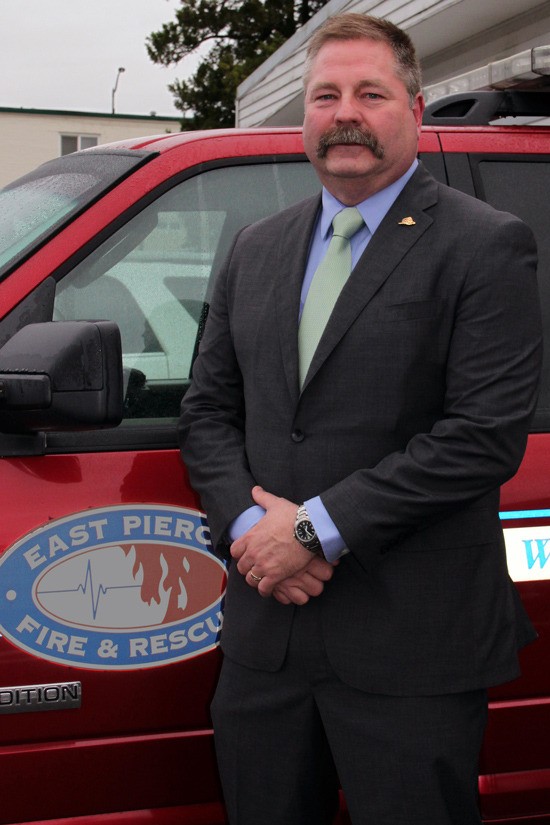The following is written by East Pierce Fire and Rescue Chief Bud Backer in response to the Courier-Heralds three-week debate over banning fireworks. Read week one, week two and week three by clicking the links.
With the current debate on a potential fireworks ban in Bonney Lake, I’ve been asked to share my experience and position on the issue.
Yes, this year’s weather was outside what our normal early July weather pattern. Summer started well before July 5th. But weather aside, the Fourth of July is always a busier day for fire departments.
This year on the Fourth of July, 20 percent of our call volume district wide was attributed to fireworks. An average day (24 hour period) in East Pierce Fire and Rescue is about 28 incidents. In 2015, we responded to 49 incidents on July 4th, compared to 37 in 2014.
Some people may ask “what’s the big deal if the fire department has to put a few more brush fires?”
It’s risky business responding to any 911 call. Accidents happen, and when they do, they are often catastrophic when they involve a fire engine. I’ve seen what a fire engine can do to a car when they collide. You wouldn’t want your family to be in that car. Nationwide, vehicle accidents responding to and returning from alarms is one of the larger killers of firefighters. Every additional alarm just creates another opportunity to have an accident.
Secondly, when responding to a fire that didn’t have to happen, those responding units are now not available for the next alarm. The units extinguishing a fireworks fire won’t be available to save the person having the heart attack; other units have to come from a farther distance to assist that patient, delaying critical care. Several times, this last Fourth of July, we were out of units to send to the next alarm. And we even had an extra unit staffed up that day, with two additional firefighters on overtime in anticipation of the extra workload. Imagine being in Bonney Lake and having chest pain, and the nearest help is coming from Auburn or Puyallup. Is that a risk you’re willing to assume?
What about the people who have their homes damaged? This last July 4th and early into the 5th, we had two homes damaged, and one destroyed by fireworks. None of those were in the city of Bonney Lake, but our resources were tied up on those fires. Those people suffered damage or the loss of their home, due to someone else lighting fireworks.
Once you light your firework, it’s no longer yours. It’s going to belong to the neighbor when it lands in their yard or worse, on their house. Very seldom do people using fireworks set their own house on fire; it’s usually the neighbor’s house. The saying “I’m only risking my own injury or property” doesn’t hold true in most cases.
There’s a lot of discussion on why ask for a total ban. Some say just enforce or ban the reservation fireworks. Well, those fireworks are already illegal when they leave the reservation, they are already banned.
Enforcement then becomes the question. While enforcement typically falls to the police or sheriff, we often are asked by citizens to track down the source of perceived illegal fireworks. Intuitively, you might be able to see a large display in the sky, or hear a loud boom, and figure it was an illegal firework. Intuition doesn’t hold up in court.
First we have to find where the fireworks are being discharged from. Unless we have a complaint to respond to, we must drive up and down each street in the area, trying to find the right location from which the possibly illegal fireworks are being discharged from.
Then if we do by chance feel we found the right place, how do we prove they discharged an illegal firework? All the evidence was destroyed in the explosion or display. The only chance it to catch the person in possession of more illegal fireworks. We must have the firework in order to read the label to determine if it’s legal or not. Even then, possession may not be illegal (depending on the type of device), only discharging such a firework might be illegal. So if we don’t have a witness that without a doubt (as defined in court) can testify that illegal fireworks were discharged by a specific person, we won’t have any legal grounds to charge the responsible party.
That is why the only ban that will work to provide for public safety is a total ban. There is no guess work; if it’s a firework, it’s illegal.
I’ve seen bans work in other cities where I’ve served. It may take a few years to catch on culturally after the ban is put into place. But bans work, the number of fires and other calls for service do go down. It just takes a stiff enough fine, and the fortitude to issue citations to make it work.
I too grew up using fireworks to celebrate freedoms offered by our great nation. But once I became a firefighter and saw the damage inflicted on those not using those fireworks, I haven’t used them since. Is it really worth putting others at risk?


